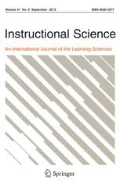References
Brünken, R., Steinbacher, S., Plass, J.L. & Leutner, D. (2002) Assessment of cognitive load within multimedia learning by the dual task methodology, Experimental Psychology 49: 109–119.
Chi, M., Glaser, R. & Rees, E. (1982) Expertise in problem solving. In: R. Sternberg (ed), Advances in the Psychology of Human Intelligence, pp. 7–75. Hillsdale, NJ: Erlbaum.
Kalyuga, S., Ayres, P., Chandler, P. & Sweller, J. (2003) The expertise reversal effect, Educational Psychologist 38: 23–32.
Paas, F., Renkl, A. & Sweller, J. (2003) Cognitive load theory and instructional design: Recent developments, Educational Psychologist 38: 1–4.
Paas, F., Tuovinen, J.E., Tabbers, H. & Van Gerven, P.W.M. (2003) Cognitive load measurement as a means to advance cognitive load theory, Educational Psychologist 38: 63–71.
Paas, F. & Van Merriënboer, J.J.G. (1994) Variability of worked examples and transfer of geometrical problem-solving skills: A cognitive-load approach, Journal of Educational Psychology 86: 122–133.
Pollock, E., Chandler, P. & Sweller, J. (2002) Assimilating complex information, Learning and Instruction 12: 61–86.
Renkl, A., Stark, R., Gruber, H. & Mandl, H. (1998) Learning from worked-out examples: The effects of example variability and elicited self-explanations, Contemporary Educational Psychology 23: 90–108.
Sweller, J. (1988) Cognitive load during problem solving, Cognitive Science 12: 257–285.
Sweller, J. (1999) Instructional Design in Technical Areas. Melbourne, Australia: ACER Press.
Teigen, K.H. (1994) Yerkes-Dodson: A law for all seasons, Theory and Psychology 4: 525–547.
Van Merriënboer, J.J.G. (1997) Training Complex Cognitive Skills: A Four-Component Instructional Design Model for Technical Training. Englewood Cliffs, NJ: Educational Technology Publications.
Van Merriënboer, J.J.G., Kirschner, P. & Kester, L. (2003) Taking the load off a learner's mind: Instructional design for complex learning, Educational Psychologist 38: 5–13.
Wulf, G. & Shea, C.H. (2002) Principles derived from the study of simple skills do not generalize to complex skills learning, Psychonomic Bulletin and Review 9: 185–211.
Author information
Authors and Affiliations
Corresponding author
Rights and permissions
About this article
Cite this article
Paas, F., Renkl, A. & Sweller, J. Cognitive Load Theory: Instructional Implications of the Interaction between Information Structures and Cognitive Architecture. Instructional Science 32, 1–8 (2004). https://doi.org/10.1023/B:TRUC.0000021806.17516.d0
Issue Date:
DOI: https://doi.org/10.1023/B:TRUC.0000021806.17516.d0

